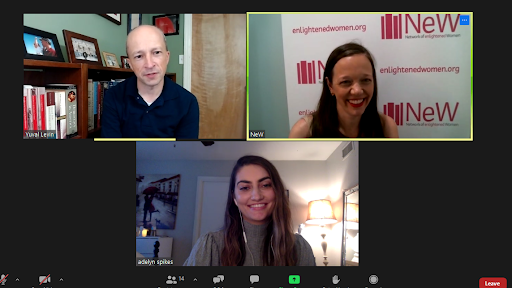Why has the American public lost trust in its institutions? How can we rebuild that trust, starting with universities and college campuses? Dr. Yuval Levin, director of social, cultural, and constitutional studies at the American Enterprise Institute, addressed these questions and more on a webinar with the Network of enlightened Women’s fall book club on his book, A Time To Build: From Family and Community to Congress and the Campus, How Recommitting to Our Institutions Can Revive the American Dream.
Levin began the conversation by naming what he calls “the problem of our [government] system now,” or the consensus that only the president’s agenda matters while the role and work of Congress has greatly diminished. Congress is no longer an institution that legislates and molds policy solutions, but instead acts more like a platform for members to build their social media following.

Social media is to blame for many of these problems, claims Levin. The internet has blurred the lines between what is public and what is private; many people today behave in public how they would in private and are treating people online in a way they never would if they were in the same room. Blurring the boundary between public and private has created a loss of standards and formality at a time when formality is needed. From cancel culture to following Sen. Krysten Sinema (D-Ariz.) into a restroom, social media has turned “everything into an arena for performance art.”
Campus culture and university actions also carry a lot of the blame for the breakdown of trust in institutions today. The university used to be a place to mold its students and teach them to seek the truth. Today, the university is more focused on becoming an arena for self-expression and a place for students to yell about culture.
According to Levin, much of what the university system does now “involves some constraints on teaching and truth.” There is a great need for the university to regain its basic sense of purpose, and conservatives should do more to defend and fight for the university, not against it. However, Levin cautioned that free speech cannot be the only end goal of those fights and that the greater focus needs to be on defending the pursuit of truth. The university shapes so many other areas of society that it’s essential for conservatives to focus their fight on rebuilding trust in the university.
According to Levin, there is hope for the future. With more Millennials and Gen Z’ers elected to Congress, they bring a fresh perspective to government. While younger members may continue to use Congress as a performance platform, such as Rep. Alexandria Ocasio-Cortez (D-N.Y.), he argued that they also feel more at home in contemporary America. Unlike the Baby Boomer generation, which currently holds the most senior positions in the United States government, younger members of Congress “are less inclined to be dazed and confused about 21st century America.”
According to Levin, the older generations are often nostalgic for the America of the late 1950s and 1960s, but for different reasons — culture for the right and economics for the left. However, Levin pointed out that neither culture nor economics were normal during that time and said, “We are doing a disservice by the intensity and degree of the nostalgia for that era.” Younger generations can see both the negatives and the positives of the 21st century and have less nostalgia for that time. With the absence of generational change in Congress, Levin is concerned that our politics are losing its focus on the future.
Levin’s book raises many questions that the younger generations must ask themselves and identifies many areas of improvement. While the future will always be uncertain, conservatives can be confident that after reading his book, they will be able to start taking concrete action towards rebuilding and restoring trust in America’s institutions.
This blog was written by Julia Canzano, NeW Campus Program and Events Associate.
